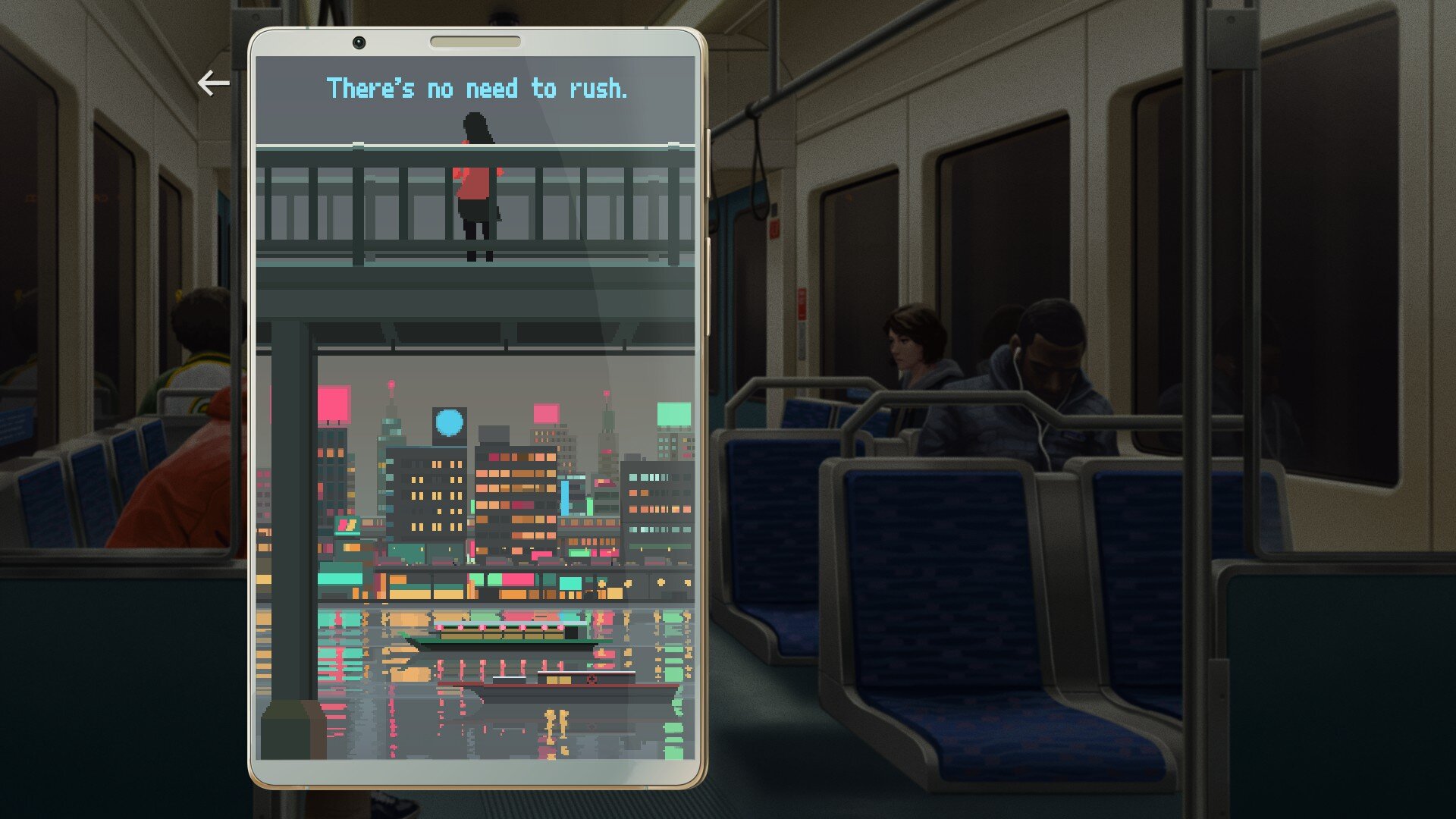LudoNarraCon | Meeting Eliza
Zachtronics’ Eliza was critically acclaimed for a nuanced and realistic depiction of the tech industry, a compelling narrative, and its delicate handling of mental health. It was also a stark departure from the team’s previous work, which mainly comprised intricate puzzle games. But what goes into creating such a realistic piece of fiction? Who better to ask than the game’s creator Matthew Seiji Burns.
The fake OSes and UIs in Eliza are so good looking they make me like the real ones I use less.
Matthew had been working at Zachtronics for a few years as a narrative designer and composer before pitching an idea he’d been quietly developing to studio founder Zach Barth. Eliza isn’t the sort of game the studio is known for, which Matthew describes as being more like “open-ended puzzle programming”. Games like Opus Magnum are highly technical and very difficult, often requiring semi-realistic programming on the part of the player. Zachtronics wanted to “stay flexible and not get tunnel vision in one single direction” and Matthew’s personal project was perfect for this. Zachtronics is a studio of just five, so while three worked on Eliza full time, Zach Barth and another team member could work on designs and prototypes for whatever came next. Zachtronics looks at Eliza “as an experiment to try something new… and stay creative with something different”. However, Matthew maintains there are common threads between Eliza and Zachtronics’ other games, such as “the consequences and implications of [software] engineering and other technical work”.
Eliza’s protagonist Evelyn, one of five creators of eponymous AI Eliza, quit the multi-billion dollar tech conglomerate rolling Eliza out after a tragedy strikes the development team. The game sees her subsequently return, not as a programmer but a proxy for Eliza at a counselling centre, the human element to make those visiting feel more comfortable speaking to a computer. These sections stand out for their authenticity. The people visiting Eliza feel real, the vocabulary they use and how they describe what they are feeling sound like they were recorded in a mental health professional’s office. I’ve spent a great deal of time in mental health facilities, and this struck me. Here is a game where characters aren’t caricatures of symptoms but people grappling with complex thoughts. More impressively, the responses given by Eliza are often uncomfortably reminiscent of things I’ve had said to me in similarly sterile rooms.
Matthew undertook a lot of research to accomplish this realism. “I looked at educational materials for those training to become counselors, interviewing current and former care providers and spoke to others, like me, who had been on the client-side”. This research only reinforced the believability of the game’s premise. As he learned about the framework of talk therapy, beginning with small talk, Matthew found that “[common] types of therapy are heavily “manualised”, where the provider follows a preset script with the client: if they say A, you say X. If they say B, you say Y”. The idea for the game came from a presentation Matthew saw about a therapy AI to help soldiers deal with PTSD. “You can see how it’s not much of a leap from there to assume that an AI could fill in that role”.
There was no fewer than three times during the meeting with Darren that I’m pretty sure I heard sentences I had said myself or have had said to me.
The world of Eliza feels eerily close to ours at almost every turn, though this wasn’t always the case, as “early attempts at the story were more science-fiction tinged, with retro-looking computers and drones flying through the air”. Matthew quickly realised it was less science fiction and more alternate reality, because “this kind of technology isn’t theoretical at all- there are startups dedicated to developing almost this exact technology today”. Zachtronics moved Eliza to the modern-day, bringing the technology more or less in line with what we see in reality. In Matthew’s eye, Eliza is basically “a slightly better Amazon Alexa”. However, shying away from the dystopian had the side effect of creating a more “oppressive world [that] comes out of the subject matter that’s covered”.
Eliza is notable as a visual novel for its linearity. Until the final act of the game, the only choices you make are dialogue options that colour Elvelyn’s personality. The interesting thing is, however, that despite five possible endings, you are not necessarily going to change anything in this world by choosing any of them. You’ve spent the last five hours going on a tour of a broken and abusive industry, but returning to work for one of the game’s competing companies may not see you ever tackle their endemic crunch problem. When asked about this purposeful lack of agency Matthew described how he was surprised after the game’s release because “[they took] some careful balancing to try to include different viewpoints… [and] some people think the game doesn’t take a standpoint at all”, which he strongly disagrees with. While he didn’t mention what side any of the conflicts the game lands on, he did mention that the most popular ending, “makes sense” and that these are “the pitfalls when you try to tell a more complex and subtle story”
“I could have been more obvious about things, but… I decided to trust that people would get it”.
This complexity extends to the characters of Eliza too. When speaking to people’s split reactions to the game’s popular love interest, Matthew brought up that, “any writer would enjoy strong reactions to their characters… it’s not interesting to create characters that are universally liked or hated, so much as ones that people feel need to discuss.” Even though he doesn’t have a definitive answer as to whether they are a cool, well-meaning person or if they have ”a more fundamental problem”, he views this character as a success, after all, “the more complicated and contradictory a character can realistically be, the more life they seem to have.”
The rest of the game’s cast of tech workers were strongly based on Matthew’s personal experience. However, he made it clear that “I [didn’t base] them off specific people I know, but I felt I could capture certain essences pretty well after having worked in these types of offices”. Their anecdotal nature paired with believable writing lends these people real credence.
A combination of stunning art and excellent performances make Eliza one of the most expressive visual novels out there.
It is not just the writing that brings these people to life. The voice acting was the final piece of the puzzle in forming this reality. Zachtronics decided to hold open auditions and wound up receiving over 1,200 submissions, a testament to the amount of meat on the bones of the script for the actors to chew. According to Matthew, this resulted in him and casting director Khris Brown spending days just listening to them and “many more days agonising over our final picks”. He would even listen to the music he was composing for the game over the audition track in the hopes of getting a feel for the best fits. The final cast comprises industry veterans like Greg Chun (Judgement), Cissy Jones (Firewatch), Yuri Lowenthal (Marvel’s Spider-man) and Roger Craig Smith (Assassin’s Creed II) who Matthew was keen to mention were all a joy to work with.
When I asked his thoughts on the glowing reviews and GOTY nods the game received, Matthew reflected that he was happily surprised by the positive reaction. He told me, “I was afraid it was too unusual to work in today’s marketplace. It’s a visual novel but not really like the kinds of visual novels that stick to a specific genre… I went back and forth between telling myself that it was pointless and that nobody would like it and having high hopes that people… [would] appreciate it”. And while he’s thankful it turned out to be the latter, he still thinks, “maybe I should have toned down some of the sadness… that occasionally surprises and unnerves people.”
“But then it would be something else, wouldn’t it? Eliza goes to some difficult places, and you have to be on board with me taking you there… But I don’t think I could have achieved the effect that it ultimately has any other way”.
More info on Eliza and Zachtronics other games on their Twitter. And Matthew can be found @matthewseiji. This interview took place as part of LudoNarraCon with special thanks to Fellow Traveller for organising the event.











